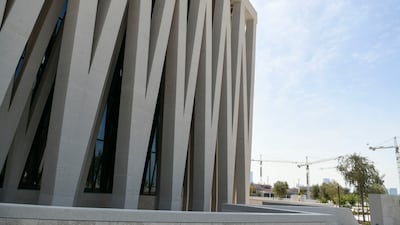One of the characteristics of successful diplomacy is that it promotes solutions, supports the shift from managing crisis and conflict to solving them, and tackles their root causes instead of exhausting resources on their symptoms only.
In this sense, religious diplomacy is an enhancement of cultural sustainability. Cementing values of co-existence and equal citizenship undermines policies built on identity seclusion and rupture with others that fabricate a confrontational environment.
The inauguration of the Abrahamic Family House in February and its opening to the public on Wednesday are landmarks in the march of the UAE towards promoting the values of tolerance, co-existence and interfaith dialogue. It is the most prominent Emirati contribution so far this year to cultural sustainability and religious diplomacy, and is part of the Emirates’ Year of Sustainability.
Religious diplomacy has become an essential tool in UAE foreign policy. As the complex was inaugurated on February 16, President Sheikh Mohamed wrote on Twitter that “building bridges of communication, coexistence and co-operation among all is the consistent approach of the UAE in its journey ... The Abrahamic Family House is an edifice for constructive, civilised dialogue and a platform for convergence for peace and human brotherhood”.
Based on the dynamic of celebrating cultural diversity and an appreciation of dialogue and communication, we are actually enhancing stability and preserving resources and energy. This is the spirit of sustainability in its comprehensive framework, concerned with making successful and just policies in the present for a better future for us and future generations.
Abdallah bin Bayyah, chairman of the UAE’s Fatwa Council, says that humanity has many common denominators, but the negligence of these and the stoking of idiosyncrasies instead have led to destruction and many wars.

Such realisation has become more urgent today because there is a global increase in “identity policies” that require a search for new tools and methods to confront these challenges and enhance values of coexistence. Thus, design initiatives protect diversity, tolerance and dialogue.
The role of religious communities, spiritual leaders and scholars is key to achieving these goals, narrowing the space of seclusion and prejudice, as well as fighting extremism and ideologies of ethnic or cultural supremacy.
I think we need more steps to enhance cultural sustainability and empower religious diplomacy. According to Nickolay Mladenov, director general of the Anwar Gargash Diplomatic Academy, this is not necessarily an easy step because “many people need training to enhance diplomacy supported by religion”.
Therefore, it is important to join hands to ensure that religion serves as a genuine and dynamic source for peace, progress and prosperity in the 21st century.
With the increasing number of hotspots across the world, there is more need to benefit from all efforts to help de-escalate tensions, enhance stability and contain violent acts and evil forms of incitement and hatred.
In this context, spiritual and religious leaders can play an influential role in promoting peace, fraternity, solidarity, benevolence and co-existence as well as safeguarding human dignity and rights.
It is also equally important to prepare diplomats to appropriately and tactfully deal with enablers that faiths and spiritual leaders have, such as faiths’ role in bringing awareness to individuals, building their identity or shaping ideas and motives for their behaviour. These faiths can also contribute to creating a healthy narrative to facilitate conflict resolution and encourage tolerance, honesty, integrity and solidarity while refraining from violating the rights of those who are vulnerable, poor and less powerful.
The necessity for religious diplomacy to play a much more significant role in the diplomatic actions of states, and regional and international organisations stems from another basic fact: that conflicts and struggles start when conditions of co-existence and tolerance are no longer met in a given community.
Amid a stalled political dialogue between conflicting parties, their priorities, interests and goals start to diverge, ending up in extreme viewpoints and non-acceptance of the other based on religious, sectarian, ethnic and cultural backgrounds. Then, each conflicting party would seek the help of external powers whose intervention can complicate the crisis and make it spill over into the whole region.
Recognising the need for dialogue among different faiths and religions to enhance mutual understanding, harmony and co-operation among people, the UN General Assembly urged all states to observe World Interfaith Harmony Week at the start of February.
It is not acceptable to overlook the significance of dialogue among religious scholars and spiritual leaders to inform religious thought so as to make it more flexible, realistic and focused on public interests.
As such, this will eventually lead to a cross-fertilisation where actors can approach issues and topics from a more balanced and holistic angle. Consequently, realistic calculations and diplomatic balances would be evident in religious scholars and spiritual leaders’ discourses and orientations.
Moreover, the added value generated by those scholars and leaders during these interactions can be incorporated in diplomatic policy which, in return, can render such a policy more acceptable, richer, deeper, more holistic and more sustainable.
That being said, the need to search for the opportunities and possibilities where religious diplomacy can contribute more to consolidating co-existence and tolerance, rejecting violence and extremism, and resolving conflicts, has even become more urgent in present.










